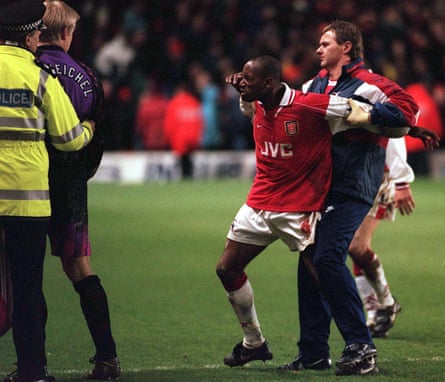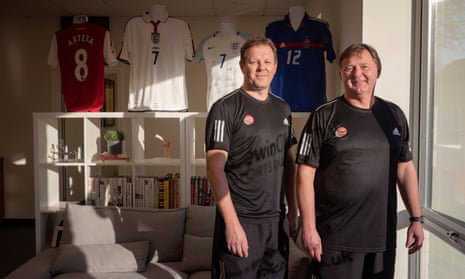Gary Lewin is looking back at a balancing act of risk and reward that, in no small way, helped Arsenal to their greatest night of all. “Micky Thomas, 1989,” he says. “He’d come off injured against Wimbledon and had a fitness test the day before we went to Anfield. I remember telling George Graham: ‘He’s fit to start but I can’t guarantee he’ll finish; if he gets one block tackle on that ligament he’ll be in trouble.’ What do I know, he scores the winner in the 92nd minute. At the time you don’t really take it in but later on you sit back and think: ‘Wow, what a difference that makes.’”
Now Lewin is sitting alongside his cousin, Colin, in the smart surrounds of the clinic they have run since October in east London. They are the most recognisable physiotherapists in English football, primarily through the combined four decades spent at Arsenal but also through Gary’s spells with England and West Ham and it has taken some adjustment to depart the weekly cut and thrust that became a way of life.
“You’re always going to miss the pressure, the emotion, although not really the politics,” Colin says. He had led Arsenal’s medical team since stepping up when Gary took the national team job in 2008 but left in 2018 – before Unai Emery’s ill-fated appointment – in a development that came out of the blue. The pair saw a gap in the market for a setup that offered everyday sporting enthusiasts – “weekend warriors,” they put it – the same holistic package from injury, to diagnosis, to treatment, to recovery that professionals receive. Using a formidable contacts book they have pulled it off and there could be some set of memoirs from the various episodes and personalities that have driven them this far.
Treating career-threatening injuries is part of the job and it was Gary, in 2008, who tended to Eduardo da Silva on the pitch at St Andrew’s after the incident that represents a sliding-doors moment in Arsenal’s modern history.
“Eduardo’s was woeful; we’ll never see one like it again,” says Colin, who accompanied the player to hospital after his fractured fibula and ankle dislocation. “You can say all you like about whether he got back to 100% but the fact he even got back to earning money playing football was pleasing because it was such a horrible injury.”
The emotional reaction came later. “When you reflect on what you did, how you did it, then it hits you,” Gary says. “When you’re on the pitch treating them there’s an element of autopilot, you do what you are trained to do. But later you ask: did you do the best, did you look after them, will they be all right, how can you reassure them? They become family.”
The last word in that sentence underpins everything. Colin reflects that the role of a physio encompasses “middle man, amateur psychologist, social worker”. It would be a shock to unearth anyone with a negative remark about their work, among the revolving door of characters who have peopled Arsenal’s last 30 years.

They struck a balance of warmth, discretion, humour and professionalism that go a long way during what could be a professional’s loneliest hours. It is why they have found supporters for the clinic in Petr Cech and Aaron Ramsey, who became investors at its inception. Ramsey, in particular, has formed a close friendship with the Lewin family since his horrible injury in 2009 and another backer can now be confirmed, too.
Mesut Özil is the third big-name player to put in money and that is a measure of the friendships the playmaker formed within Arsenal’s backroom team. “I’ve always liked Colin’s way of working, with us as players and also everyone else at the club,” Özil says. “It’s been a relationship of respect and honesty, which counts for a lot when you could be trying to return from injury, which can be a very difficult time. You put a lot of pressure on yourself, and just want to be back out on the pitch, and have to listen to the staff around you. I believe in Colin and Gary, who has incredible experience in the industry, and I’m really happy to be involved.”
They count a number of current players among their clients but the aim is to provide that support network for amateurs, too. “In the real world, if you get injured during sport and can’t work it’s life-changing,” Gary says. “We want to create a pathway where we get them back to full fitness and back to work but also educate them on what they can do to stop the injury recurring.”

It is certainly a remove from those days of making calls that influence, or give rise to, historic moments. Colin remembers his equivalent of that Thomas tale, when Arsenal beat Barcelona nine years ago in the best match to have been contested at the Emirates Stadium. “Samir Nasri had only started training the previous day after hurting his hamstring; towards the end he’s put down the right and sprinting 50 metres and literally every step you’re thinking: ‘He’s going to do his hamstring.’ He got the ball, pulled it back, Arshavin scored and the place was jumping. But nobody knew the story that Samir only just about got back and we’d taken a big risk. We got it right but nobody’s ever going to say: ‘Brilliant, you got it right.’ But had we got it wrong …”
It could be, not that he is complaining, a relatively thankless task with only a player and his agent sometimes aware of the work needed to make him match-ready. Arsène Wenger was “not forthcoming with his praise often but you knew when he knew,” Colin says.
Both men want the Premier League to facilitate an injury audit, saying it would provide crucial context for clubs to work within and pointing out the figures and information given to the public are rarely exact, with medical teams often sold short in the wider perception.
It is particularly relevant to hear where they believe their industry needs to smarten up. Colin cites two particular concerns, the first being many players’ reliance on outside therapists with no ties to their clubs. “It’s massive problem, getting worse and worse,” he says. “I know of many problems and I’m not naive enough to think we didn’t have an issue with it at Arsenal. These people haven’t even got to be qualified.” He references “outside information that is very often uneducated and with a poor agenda”.
He also detects a growing trend among medical teams to celebrate their injury records rather than success on the pitch. “Our injury record in 2002 wasn’t particularly good but we won the league, so nobody heard about it,” he says. “But I think we’re getting close to a time when some medical teams are losing games but have no injuries and seeing that as a success.”
They both remain familiar faces at Arsenal. Gary still works with the women’s team while Colin has, since what he admits was a painful exit, watched games and attended events. Mikel Arteta remains a friend from his playing days – “Even when he left we joked that he’d return and Arsène did too” – and perhaps, had the stars aligned differently, their professional relationship would be continuing now.
There is no sense of regret at leaving Arsenal and one of football’s more unique double acts rolls on to its newest challenge. “Our idea is to create something completely different,” Gary says of the clinic. It won’t win league titles but the end product could be even more valuable.
